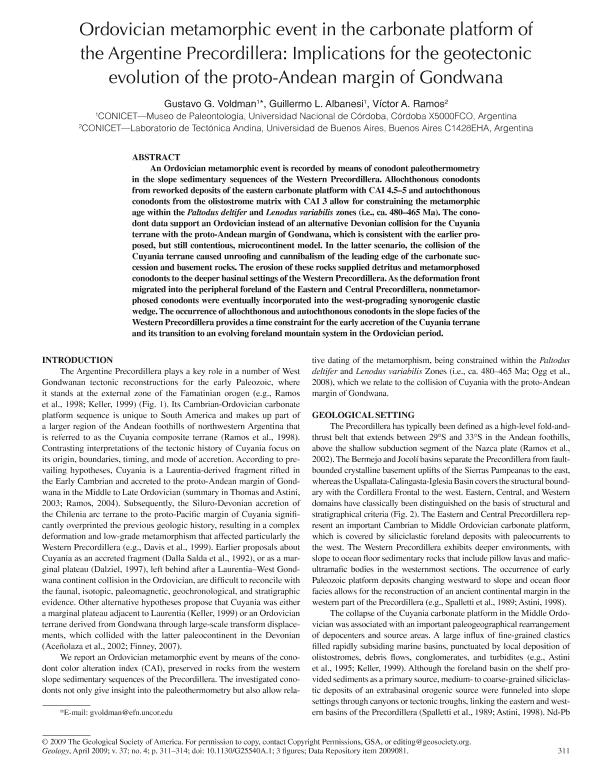Mostrar el registro sencillo del ítem
dc.contributor.author
Voldman, Gustavo Gabriel

dc.contributor.author
Albanesi, Guillermo Luis

dc.contributor.author
Ramos, Victor Alberto

dc.date.available
2018-08-16T17:33:52Z
dc.date.issued
2009-12
dc.identifier.citation
Voldman, Gustavo Gabriel; Albanesi, Guillermo Luis; Ramos, Victor Alberto; Ordovician metamorphic event in the carbonate platform of the Argentine Precordillera: Implications for the geotectonic evolution of the proto-Andean margin of Gondwana; Geological Society of America; Geology; 37; 4; 12-2009; 311-314
dc.identifier.issn
0091-7613
dc.identifier.uri
http://hdl.handle.net/11336/55935
dc.description.abstract
An Ordovician metamorphic event is recorded by means of conodont paleothermometry in the slope sedimentary sequences of the Western Precordillera. Allochthonous conodonts from reworked deposits of the eastern carbonate platform with CAI 4.5-5 and autochthonous conodonts from the olistostrome matrix with CAI 3 allow for constraining the metamorphic age within the Paltodus deltifer and Lenodus variabilis zones (i.e., ca. 480-465 Ma). The conodont data support an Ordovician instead of an alternative Devonian collision for the Cuyania terrane with the proto-Andean margin of Gondwana, which is consistent with the earlier proposed, but still contentious, microcontinent model. In the latter scenario, the collision of the Cuyania terrane caused unroofing and cannibalism of the leading edge of the carbonate succession and basement rocks. The erosion of these rocks supplied detritus and metamorphosed conodonts to the deeper basinal settings of the Western Precordillera. As the deformation front migrated into the peripheral foreland of the Eastern and Central Precordillera, nonmetamorphosed conodonts were eventually incorporated into the west-prograding synorogenic clastic wedge. The occurrence of allochthonous and autochthonous conodonts in the slope facies of the Western Precordillera provides a time constraint for the early accretion of the Cuyania terrane and its transition to an evolving foreland mountain system in the Ordovician period.
dc.format
application/pdf
dc.language.iso
eng
dc.publisher
Geological Society of America

dc.rights
info:eu-repo/semantics/openAccess
dc.rights.uri
https://creativecommons.org/licenses/by-nc-sa/2.5/ar/
dc.subject
Color Alteration
dc.subject
Cuyania
dc.subject
Lower Paleozoic
dc.subject.classification
Meteorología y Ciencias Atmosféricas

dc.subject.classification
Ciencias de la Tierra y relacionadas con el Medio Ambiente

dc.subject.classification
CIENCIAS NATURALES Y EXACTAS

dc.title
Ordovician metamorphic event in the carbonate platform of the Argentine Precordillera: Implications for the geotectonic evolution of the proto-Andean margin of Gondwana
dc.type
info:eu-repo/semantics/article
dc.type
info:ar-repo/semantics/artículo
dc.type
info:eu-repo/semantics/publishedVersion
dc.date.updated
2018-08-13T17:23:11Z
dc.identifier.eissn
1943-2682
dc.journal.volume
37
dc.journal.number
4
dc.journal.pagination
311-314
dc.journal.pais
Estados Unidos

dc.journal.ciudad
Boulder
dc.description.fil
Fil: Voldman, Gustavo Gabriel. Consejo Nacional de Investigaciones Científicas y Técnicas. Oficina de Coordinación Administrativa Ciudad Universitaria. Instituto de Estudios Andinos ; Argentina
dc.description.fil
Fil: Albanesi, Guillermo Luis. Consejo Nacional de Investigaciones Científicas y Técnicas. Centro Científico Tecnológico Conicet - Córdoba. Centro de Investigaciones en Ciencias de la Tierra. Universidad Nacional de Córdoba. Facultad de Ciencias Exactas Físicas y Naturales. Centro de Investigaciones en Ciencias de la Tierra; Argentina
dc.description.fil
Fil: Ramos, Victor Alberto. Universidad de Buenos Aires. Facultad de Ciencias Exactas y Naturales. Departamento de Geología. Laboratorio de Tectónica Andina; Argentina
dc.journal.title
Geology

dc.relation.alternativeid
info:eu-repo/semantics/altIdentifier/url/https://bit.ly/2OECOVK
dc.relation.alternativeid
info:eu-repo/semantics/altIdentifier/doi/https://doi.org/10.1130/G25540A.1
Archivos asociados
